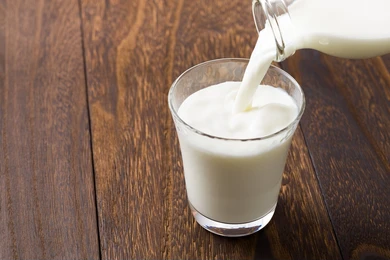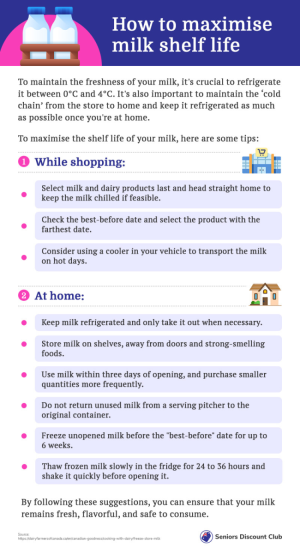Save money on milk with this cost-efficient shopping – Is owning a dairy cow the answer?
By
- Replies 4
Milk is a staple grocery item that many of us rely on daily. Whether you pour it over your cereal, add it to your coffee, use it in your cooking, or drink it on its own, it's a versatile ingredient that adds richness to many dishes.
But with the rising cost of groceries, we're always looking for ways to save money.
Unfortunately, when it comes to dairy, it's not as simple as just cutting back to save a few dollars.
Milk and dairy products are essential sources of calcium and other nutrients that our bodies need to stay healthy.
One mum took to social media to share a dilemma she has with budgeting and ensuring that her family gets enough milk.

The mum asked the Markdown Addicts Facebook group for tips on how to get milk for a lower price.
Her post read: 'Aside from buying a dairy cow, is there a cheaper way to buy milk?’
‘We are a family of 5 and now go through about 3 litres a day. I usually just buy the 3-litre bottles from the supermarket, but I feel there must be something cheaper I don’t know about?'
While the thought of a family dairy cow seemed to be an out-of-the-box idea for saving money on milk, is it a cheaper option?
One commenter, who claimed to be working on a dairy farm, weighed in on the suggestion and gave insights on the proposal.
According to the user, the initial cost of buying the cow is even more expensive than imagined. It can cost anywhere between $1,000 to $1,500 for an excellent milker who is trained for hand milking.
Of course, you’ll also need to feed the cow daily to ensure a sufficient milk supply (the cost of hay and grain or pellets can add up to $200 a week).
Plus, you’ll need somewhere to house the cow and drench them every six weeks to keep parasites away, noting that 1L of drench costs $130.
And if you’re after an ongoing milk supply, you need to get the cow pregnant every year, which can cost around $500.
But don’t forget - you’ll need to give the cow at least three months to dry up before giving birth, so you’ll need to juggle owning two cows and alternating their drying times.
Perhaps the toughest part is learning to hand milk and milking twice a day. That’s why it pays to be prepared for any unexpected vet bills – or if the cow gets mastitis, a condition where breast tissues get inflamed or infected from hand milking.
So if you think buying a dairy cow is cheaper than store-bought milk, you may want to think again.
Other group members pointed out that the best options might be looking out for clearance prices and stocking up on discounted milk.
One person suggested: ‘Keep an eye out for clearance prices and freeze. Thaws just fine.’
Some users urged the mum to rethink her family’s milk consumption as they seemed to be consuming an ‘unhealthy’ amount of milk per person.
One person questioned: ‘No judgement, but how is each person having more than half a litre per day?’
‘You don’t want to hear this but cut back on that dairy.’
The mother went on to explain that the kids consume 3 L of milk per day and not the adults, acknowledging the other comments from concerned users who pointed out that too much dairy might cause digestive problems in adults.
Meanwhile, others suggested opting for powdered milk. However, one user said powdered milk is heavily processed and unhealthy for growing children.
One person claimed: ‘For someone who grew up on powdered milk, I wouldn't suggest it.’
Nonetheless, many still believe that buying full-cream milk directly from local dairy farmers is the superior choice, as they offer more affordable dairy products and ensure that the products are fresh.

There you have it, folks! While finding ways to save on groceries is important, owning a dairy cow is not the most practical option for seniors.
Keep an eye out for discounts, purchase from local farmers if possible, and try incorporating other forms of calcium and nutrients into the diet to take some of the pressure off the family milk supply.
Remember, every dollar saved helps ensure financial stability during retirement and allows for greater enjoyment of your golden years!
Do you know other tips for saving money on milk? Share them with us in the comments below!
But with the rising cost of groceries, we're always looking for ways to save money.
Unfortunately, when it comes to dairy, it's not as simple as just cutting back to save a few dollars.
Milk and dairy products are essential sources of calcium and other nutrients that our bodies need to stay healthy.
One mum took to social media to share a dilemma she has with budgeting and ensuring that her family gets enough milk.

Despite the fact that the rising cost of dairy products can significantly increase grocery bills, many shoppers find it challenging to reduce their consumption of milk. Credit: Shutterstock.
The mum asked the Markdown Addicts Facebook group for tips on how to get milk for a lower price.
Her post read: 'Aside from buying a dairy cow, is there a cheaper way to buy milk?’
‘We are a family of 5 and now go through about 3 litres a day. I usually just buy the 3-litre bottles from the supermarket, but I feel there must be something cheaper I don’t know about?'
While the thought of a family dairy cow seemed to be an out-of-the-box idea for saving money on milk, is it a cheaper option?
One commenter, who claimed to be working on a dairy farm, weighed in on the suggestion and gave insights on the proposal.
According to the user, the initial cost of buying the cow is even more expensive than imagined. It can cost anywhere between $1,000 to $1,500 for an excellent milker who is trained for hand milking.
Of course, you’ll also need to feed the cow daily to ensure a sufficient milk supply (the cost of hay and grain or pellets can add up to $200 a week).
Plus, you’ll need somewhere to house the cow and drench them every six weeks to keep parasites away, noting that 1L of drench costs $130.
And if you’re after an ongoing milk supply, you need to get the cow pregnant every year, which can cost around $500.
But don’t forget - you’ll need to give the cow at least three months to dry up before giving birth, so you’ll need to juggle owning two cows and alternating their drying times.
Perhaps the toughest part is learning to hand milk and milking twice a day. That’s why it pays to be prepared for any unexpected vet bills – or if the cow gets mastitis, a condition where breast tissues get inflamed or infected from hand milking.
So if you think buying a dairy cow is cheaper than store-bought milk, you may want to think again.
Other group members pointed out that the best options might be looking out for clearance prices and stocking up on discounted milk.
One person suggested: ‘Keep an eye out for clearance prices and freeze. Thaws just fine.’
Some users urged the mum to rethink her family’s milk consumption as they seemed to be consuming an ‘unhealthy’ amount of milk per person.
One person questioned: ‘No judgement, but how is each person having more than half a litre per day?’
‘You don’t want to hear this but cut back on that dairy.’
The mother went on to explain that the kids consume 3 L of milk per day and not the adults, acknowledging the other comments from concerned users who pointed out that too much dairy might cause digestive problems in adults.
Meanwhile, others suggested opting for powdered milk. However, one user said powdered milk is heavily processed and unhealthy for growing children.
One person claimed: ‘For someone who grew up on powdered milk, I wouldn't suggest it.’
Nonetheless, many still believe that buying full-cream milk directly from local dairy farmers is the superior choice, as they offer more affordable dairy products and ensure that the products are fresh.
Key Takeaways
- A mum asked for advice on finding cheaper milk options for her family of five without resorting to buying a dairy cow.
- Dairy farm employees weighed in on the costs of a family cow, highlighting the expenses, effort, and possible difficulties involved.
- Group members suggested looking for clearance prices, freezing milk, and offering tips on maximising milk shelf life.
- Some users questioned the family's milk consumption, while others suggested alternatives like powdered milk or buying directly from local dairy farmers.
There you have it, folks! While finding ways to save on groceries is important, owning a dairy cow is not the most practical option for seniors.
Keep an eye out for discounts, purchase from local farmers if possible, and try incorporating other forms of calcium and nutrients into the diet to take some of the pressure off the family milk supply.
Remember, every dollar saved helps ensure financial stability during retirement and allows for greater enjoyment of your golden years!
Do you know other tips for saving money on milk? Share them with us in the comments below!








